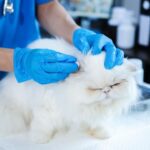Siberian Cat Diet: Siberian cats are a beautiful breed of felines that originated from Russia. They are known for their thick fur, big paws, and playful personalities. If you own a Siberian cat or you are planning on getting one, it is important to know what their dietary needs are. In this article, we will explore the Siberian cat diet, purebred Russian Siberian cat diet, and Russian Siberian cat diet. We will also discuss the different types of food that are suitable for Siberian cats and how to choose the right food for your pet.
Contents
Siberian Cat Diet

Siberian cats are natural hunters, so their diet should reflect their carnivorous nature. According to veterinarians, a Siberian cat’s diet should consist of high-quality protein, moderate fat, and low carbohydrates. The best way to ensure that your cat is getting a balanced diet is to feed them a combination of wet and dry food. Wet food is an excellent source of moisture, which helps to keep your cat hydrated. Dry food, on the other hand, is good for their teeth and helps to keep them clean.
Protein:
Siberian cats require a diet that is rich in protein. Protein is essential for building and repairing muscle tissue, and it also provides energy. When choosing food for your Siberian cat, make sure that the first ingredient is a high-quality protein source. Fish, poultry, and turkey are all great sources of protein for cats. If your cat has a sensitivity to certain types of protein, you can try feeding them food that is made with alternative protein sources such as duck or venison.

Fat:
Siberian cats require moderate amounts of fat in their diet. Fat provides your cat with energy and helps to keep their coat healthy and shiny. When choosing food for your cat, look for food that contains healthy fats such as omega-3 fatty acids. These fats are essential for your cat’s overall health and well-being.
Carbohydrates:
Siberian cats require a low-carbohydrate diet. Carbohydrates are not essential for cats, and they can be difficult for them to digest. When choosing food for your cat, look for food that contains a low amount of carbohydrates. Avoid food that contains fillers such as corn, wheat, or soy.
Purebred Russian Siberian Cat Diet
Purebred Russian Siberian cats have slightly different dietary needs than other Siberian cats. These cats are bred to be larger and more muscular than their counterparts, so they require more protein in their diet. They also require more fat to help support their larger size.

Protein:
Purebred Russian Siberian cats require a diet that is high in protein. Look for food that contains at least 40% protein. High-quality protein sources such as chicken, turkey, and fish are essential for these cats.
Fat:
Purebred Russian Siberian cats require a diet that is high in fat. Look for food that contains at least 20% fat. Omega-3 fatty acids are essential for these cats to help support their larger size and keep their coat healthy and shiny.
Carbohydrates:
Purebred Russian Siberian cats require a low-carbohydrate diet. Look for food that contains less than 10% carbohydrates. Avoid food that contains fillers such as corn, wheat, or soy.
Russian Siberian Cat Diet
Russian Siberian cats have slightly different dietary needs than other Siberian cats. These cats are bred to be more active and agile, so they require more energy in their diet. They also require more protein to help support their active lifestyle.

Protein:
Russian Siberian cats require a diet that is high in protein. Look for food that contains at least 35% protein. High-quality protein sources such as chicken, turkey, and fish are essential for these cats.
Fat:
Russian Siberian cats require a diet that is moderate in fat. Look for food that contains at least 15% fat. Omega-3 fatty acids are essential for these cats to help support their active lifestyle and keep their coat healthy and shiny.
Carbohydrates:
Russian Siberian cats require a low-carbohydrate diet. Look for food that contains less than 15% carbohydrates. Avoid food that contains fillers such as corn, wheat, or soy.
Choosing the Right Food for Your Siberian Cat
When choosing food for your Siberian cat, it is important to read the ingredients list carefully. Look for food that contains high-quality protein sources, healthy fats, and low carbohydrates. Avoid food that contains fillers such as corn, wheat, or soy. It is also important to choose food that is appropriate for your cat’s age and activity level. Kittens and senior cats have different dietary needs than adult cats.
Conclusion:
Siberian cats are beautiful and playful pets that require a balanced and nutritious diet. When choosing food for your cat, it is important to consider their age, activity level, and specific breed. Make sure that the food you choose contains high-quality protein sources, healthy fats, and low carbohydrates. By providing your Siberian cat with a balanced diet, you can help to ensure that they live a long and healthy life.

FAQs
Q: What should I feed my Siberian cat?
A: Siberian cats are carnivorous and require a diet that is high in protein, moderate in fat, and low in carbohydrates. You should feed your cat a combination of wet and dry food, and look for food that contains high-quality protein sources such as chicken, turkey, and fish. Healthy fats such as omega-3 fatty acids are also important for your cat’s overall health and well-being. Avoid food that contains fillers such as corn, wheat, or soy, and choose food that is appropriate for your cat’s age and activity level.
Q: How much food should I feed my Siberian cat?
A: The amount of food you should feed your Siberian cat depends on their age, weight, and activity level. Adult cats typically require 2-3 small meals per day, while kittens may require more frequent feedings. To establish the right serving size for your cat, speak with your veterinarian. It is important to monitor your cat’s weight and adjust their portion size accordingly to prevent obesity.
Q: Can I feed my Siberian cat a vegetarian or vegan diet?
A: No, you should not feed your Siberian cat a vegetarian or vegan diet. Cats are obligate carnivores, which means they require nutrients that are only found in animal products. Feeding your cat a vegetarian or vegan diet can lead to nutrient deficiencies and health problems. It is important to provide your cat with a balanced and nutritious diet that meets their specific dietary needs.












2 thoughts on “Siberian Cat Diet: What to Feed Your Furry Friend”